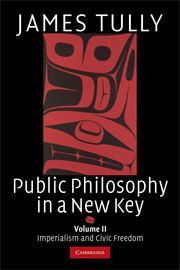Book contents
- Frontmatter
- Contents
- Acknowledgments
- Credits
- INTRODUCTION
- PART 1 GLOBAL GOVERNANCE AND PRACTICES OF FREEDOM
- 1 The Kantian idea of Europe: critical and cosmopolitan perspectives
- 2 Democracy and globalisation: a defeasible sketch
- 3 An ecological ethics for the present
- 4 The unfreedom of the moderns in comparison to their ideals of constitutional democracy
- PART 2 ON IMPERIALISM
- CONCLUSION: CIVIC FREEDOM CONTRA IMPERIALISM
- Bibliography
- Index to Volume II
3 - An ecological ethics for the present
a defeasible sketch
Published online by Cambridge University Press: 05 September 2012
- Frontmatter
- Contents
- Acknowledgments
- Credits
- INTRODUCTION
- PART 1 GLOBAL GOVERNANCE AND PRACTICES OF FREEDOM
- 1 The Kantian idea of Europe: critical and cosmopolitan perspectives
- 2 Democracy and globalisation: a defeasible sketch
- 3 An ecological ethics for the present
- 4 The unfreedom of the moderns in comparison to their ideals of constitutional democracy
- PART 2 ON IMPERIALISM
- CONCLUSION: CIVIC FREEDOM CONTRA IMPERIALISM
- Bibliography
- Index to Volume II
Summary
THREE APPROACHES TO THE CENTRAL QUESTION
In his address to the conference on environmental justice and global ethics from which this chapter derives, Arne Naess stated that the ‘central question’ is, ‘how can the fact of cultural and philosophical difference on justice and nature be reconciled with the urgent need to deliver fair judgments in cases of conflict between development and the environment, exploitation and conservation?’ I agree that this is one of the central questions of the present. The importance of the question is that it orients critical reflection not towards some abstract question of world-views or of an imaginary world beyond conflict, but towards what is happening here and now: to the conflicts over our relation to the environment and how they are to be addressed. In response, I would like to sketch an ethics, a way of thinking and acting, appropriate to this situation of environmental conflict in which we are engaged. By an ‘ethics’, I mean a public philosophy that enables people to analyse critically cases of environmental conflict on the one hand, and to act ethically and effectively to bring about fair judgments on the other. I will begin by introducing this type of ecological ethics as a response to the limitations of two better-known alternative and complementary approaches.
(1) Universal rights. The most prominent approach is to try to work out very general principles of environmental justice that should apply to any situation of conflict.
- Type
- Chapter
- Information
- Public Philosophy in a New Key , pp. 73 - 90Publisher: Cambridge University PressPrint publication year: 2008

